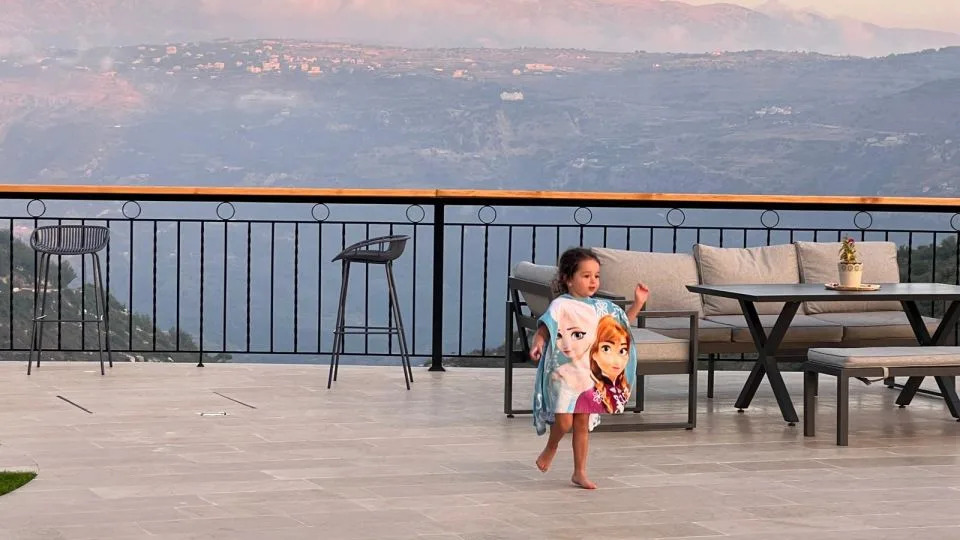Since the war began in Lebanon in 1975, the lives of the Lebanese have been punctuated with surges of violence then brief but artificial truces and breaks. Leaving the country always had a feeling of "may never be back or seeing it again", and returning for occasional visits was always tainted with fear and apprehension.
Most Lebanese are refugees. Many in fact became refugees in their own country. My family moved seven different times during the 1975-1979 interim, fleeing the shelling by the Syrians and the Palestinians, and now my family lives in a town in which they have no roots. For reasons having to do with the high quality education they receive and their ability at succeeding in their countries of exile, Lebanese refugees never settle in tents and wait for handouts. But deep down, despite the appearances, we are all refugees and exiles.
The road from and to the only functioning airport still goes through the hotbed of anarchy and violence known as the Southern Suburbs of Beirut. In the 1970s and 1980s, it was the Palestinians of the camps of Sabra and Shatila who robbed, killed, sniped and kidnapped, and since the 1990s, it became Hezbollah's turf for killing, kidnapping, blowing up bombs and setting up checkpoints.
During the Syrian occupation, the Mukhabaraat - the not-so-intelligent Intelligence Services of the Assad criminals - controlled the airport. Their men had large accounting books with lists of wanted people, and after you finished going through Lebanese-manned passport checks and customs, there was this final door where filthy Baathist criminals in civilian dress checked your name against their lists.
Year after year, it's been like this for 50 years. Never once did it feel good to come home, and worse was the feeling of leaving. Many Lebanese never really wanted to emigrate to begin with, but they had to. And this exile never heals. Why should this tiny country have to go through this endless tragedy? Because of religion, of course, but more so because of the games that Syria, Israel, Palestine, Iran, Saudi Arabia, Lybia, Kuwait, the United States and others have been playing on its soil.
And today, we are again at one of those moments where those who came to visit relatives during the summer vacation have to leave in a hurry for fear of being trapped because the fanatics of Muslim Shiite Iran might retaliate against the fanatics of Jewish Israel, in which case the Israeli thugs respond by bombing the airport, thus cutting off the country from the rest of the world.
I remember one trip in particular in the mid-1980s when the airport had been closed for a few months and people took the boat between Cyprus and the town of Jounieh to commute in and out of the country. We flew from the US (Chicago) to Francfort, took the train to Munich, flew from Munich to Larnaca, Cyprus, and boarded a Lebanese Army helicopter from Larnaca to the locality of Adma, just north of Jounieh. The helicopter shuttle was mostly used to ferry diplomats and politicians, and we were lucky to have someone book us the helicopter flight from Larnaca. "We" consisted of myself, my wife and my 7-months old daughter whom we wanted baptized in Lebanon. While in Lebanon, the helicopter shuttle was the target of an anti-aircraft attack, and the shuttle operation stopped. So there was no way to return except on a 12-hour nightly boat ride to Larnaca, which we did.
Here is the testimony of one such family experiencing the same trauma in 2024, 49 years since the start of the war. At least, the airport is still functioning, but not for long.
-------------------------------------------------------------------------
Those leaving Lebanon hold their families extra tight as they say goodbye
Ivan Watson, CNN
Mon, August 5, 2024
When our plane finally took off from Beirut, it was nearly an hour late.
The mood in the sold-out cabin was grim. Like many of the passengers, my family and I had been on vacation in Lebanon last week, trying to enjoy a long-awaited reunion with my in-laws.
Instead, we watched with growing dread and absolute powerlessness, as day by day, rocket strikes and assassinations pushed this beautiful corner of the eastern Mediterranean ever closer to all-out war.
On Saturday, the US Embassy in Beirut joined a growing chorus of diplomatic missions urging their citizens to purchase any airplane seat possible to get out of Lebanon, before it was too late. Airlines were already cancelling flights left and right, leading to a scramble for tickets.
Everyone remembers the 2006 war between Israel and the Lebanese Shiite militia Hezbollah, when Israeli jets bombed Beirut airport less than 24 hours after hostilities began. It stranded tens of thousands of foreigners, forcing governments to send warships to evacuate their citizens.
On Sunday, we left behind my 11-year-old niece Angelina, who just had her first surf lesson; my sister-in-law Ghenwa, a librarian at a university in Beirut who recently trained in her spare time to be a reiki healer; and my brother-in-law Hussein, who runs a flower shop. Before departing for the airport, we held each other extra tight, not sure when we would see each other again.

Katya and her cousins, age 9 and 11, watch the sunset in Beirut on Tuesday, July 30. Moments later, the Israeli military carried out a “targeted strike” in southern Beirut, roughly 10 minutes’ drive away. - Ivan Watson/CNN
I spent months planning this trip, the first time my wife would see her sister and mother in more than a year.
The day we landed in Beirut, a rocket hit an ethnic Druze village in the Israeli-occupied Golan Heights, killing at least 12 children.
Israel’s Prime Minister Benjamin Netanyahu blamed Hezbollah for the attack and rushed home from a visit to the US, vowing retribution. The Lebanese militant group “firmly” denied responsibility.
Tuesday evening, minutes after my 3-year-old daughter Katya returned from eating ice cream on the Beirut waterfront with her cousins, Israel carried out an airstrike in the southern Beirut suburb of Harat Hraik. It killed a senior Hezbollah commander Fu’ad Shukr, as well as at least 2 women and 2 children according to Lebanese authorities.
From the rooftop swimming pool of the hotel where we were staying, I could see a cloud of smoke billowing over the densely populated neighborhood. In fact, an hour before the Israeli missiles struck, I had been driving my rental car down a highway just a few blocks from the 5-story building that had just been destroyed.
The next morning, we awoke to learn that the political leader of Hamas, Ismail Haniyeh, had been mysteriously assassinated in Tehran. Iran and its ally Hezbollah were now making their own declarations, calling for revenge against Israel. The drumbeat for war had begun.
Unfortunately, Lebanese are no strangers to chaos and conflict.
This little country bears deep scars following decades of civil war, invasion, occupation, and chronic mismanagement.
Much of the population lost its savings in a 2021 financial crisis when the banks all but collapsed. There hasn’t been a president for year and a half, due to gridlock between rival political factions. And Sunday marked the 4-year anniversary of a devastating explosion in the Beirut port caused by the warehousing of 2,750 tonnes of the industrial chemical ammonium nitrate.
The blast killed more than 200 people, and yet no one has been prosecuted for this deadly negligence.
And then, there is the nearly 10-month war on Lebanon’s southern border between Hezbollah and Israel, which has killed hundreds and displaced tens of thousands of Lebanese and Israeli civilians.
Hezbollah began launching rocket attacks on Israel in solidarity with Palestinians in Gaza, the day after Hamas’ deadly assault on Israel on October 7 – a vivid example of this complicated region’s tangled web of alliances.
One might wonder, what sort of fool would bring his wife and daughter on vacation to a place like this?
The fact is, Lebanon was enjoying a big tourist season this summer, with reports of more than 600,000 tourists arriving in May and June.
Most of these travelers were likely members of the country’s enormous and relatively well-off diaspora; their summer pilgrimage testament to the magnetic pull of family and homeland.
And so, even as officials in Tel Aviv, Washington, Tehran issued their threats, families in Beirut packed restaurants and beaches, determined to make the best of a terrible situation.

Lebanese dance troupe Mayyas performed on an outdoor stage in Beirut on Thursday, August 1 before an audience of thousands. - Ivan Watson/CNN
On Thursday night, my wife and I joined thousands of people at an outdoor stage performance of the Lebanese dance troupe Mayyas, winners of the 2022 season of America’s Got Talent. Meanwhile, the airwaves of Lebanon’s Virgin Radio haven’t stopped promoting an endless succession of parties and club nights, some hosted by its own DJ Jack Sleiman.
But despite the “you only live once” reputation of Lebanon, people here know all too well the pain and suffering that a war may bring.
My wife’s family are moving her grandmother, an 88-year-old stroke victim who can’t walk, out of her home in Beirut’s southern suburbs to her sister’s apartment in another, “safer” part of town. Other acquaintances in southern Beirut called my brother-in-law Hussein, desperate to find other homes to rent, knowing that in 2006 Israeli warplanes repeatedly bombed the neighborhood.
The growing exodus of visitors from overseas will likely have a devastating effect on the Lebanese economy. As I paid the bill at our hotel, the manager sadly told me occupancy plunged from 80% to 40% in just two days.
“If I were you, I would leave Lebanon now,” he warned me.

Katya at a cabin in the Lebanese mountains on Friday, August 2. The next day, the hills shook with the sound of sonic booms as Israeli war planes broke the sound barrier overhead. - Ivan Watson/CNN
Instead, we took the kids up to a little cabin in the mountains for the weekend. After all, I couldn’t get plane tickets out until Sunday afternoon.
There, Katya splashed in a little pool with Angelina and 9-year-old cousin Taym, as the adults took in panoramic views of a wide valley and villages on distant ridges.
But on Saturday afternoon, the alpine peace was suddenly shattered by an enormous boom, which shook the cottage walls and echoed across the mountains. Seconds later, a second boom erupted.
The children barely noticed, but my adrenaline spiked, and I looked for smoke on the horizon. “It’s just the planes,” my brother-in-law laughed.
The CNN team in Beirut later confirmed reports that Israeli warplanes had broken the sound barrier in skies over Lebanon. Those sonic booms have become part of the sound of summer.
We flew away from Lebanon, leaving behind so many innocent people who may soon be plunged into a situation that is far, far worse. The worst part is there is little any of them can do to stop it.

No comments:
Post a Comment